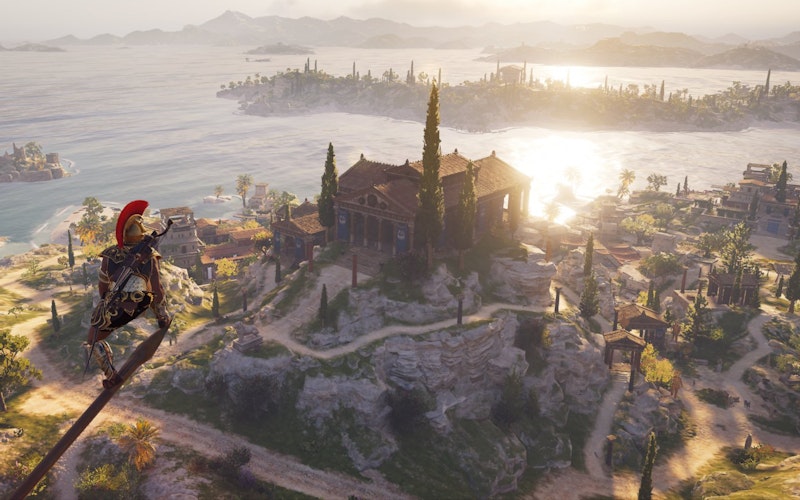
Games
The Unknown God of Assassin’s Creed Odyssey
Assassin’s Creed Odyssey is an incredible story told across the landscape of ancient Greece, circa 350 BCE, where players can take on the role of either Kassandra or Alexios, Spartan siblings. While playing, I stood in the market of Korinth, looking up at the temple of Aphrodite and listening to the worshipping murmurs of her priestesses. It suddenly hit me: this is the city addressed in 1 and 2 Corinthians. The religious landscape around me was the foundation for the religious reality into which the early church was born.
From this point on I became acutely aware that each sync point (a way of acclimating to the environment and revealing important landmarks and events) was at the top of a temple. To understand the world, you have to visit the temples built upon the high places, where people came in droves to seek help for their struggles, call upon the gods for relief, and, most often, make sacrifices to appease the various gods that they felt had left them cast about in the storms of life. Assassin’s Creed Odyssey allows you to become an agent of the gods and answer the people’s prayers through a host of side-quests: attempting to save a loved one from a hunting trip gone horribly wrong; fetching some herbs to stave off illness; or proving that someone had not offended the gods and did not need to be thrown from the heights to appease them.
In each situation you can choose to either participate in the belief that you are an answer to prayer, or you can confront the religious assumptions of the prevailing culture and reveal yourself to be nothing more than a person who is pursuing justice of their own accord. Choosing this second option creates some very complicated situations. The idea that there is something more than bowing to the whims of the gods is so foreign to most of the people in the game that when you do confront manipulative priests or self-destructive beliefs, it results in anger or disappointment towards you. The cognitive dissonance caused by offering an opportunity to pursue a truer form of justice or peace outside the oppression of the religious structures leads most to turn against you.
Several times I was threatened or corrected for saying I was simply a person trying to do good in the world rather than a servant of the gods. One instance involved Daphnae, leader of the Daughters of Artemis. Early in the game I was tasked with hunting several legendary animals and returning with their pelts. This hunt took most of the game to complete and fostered a deep relationship with Daphnae. After turning in the last pelt, she informed me that I had to duel her to the death to replace her as the leader of the Daughters. When I opposed her senseless death, she became furious with me for denying Artemis. “I will not defy Artemis,” she said. “Though it may break my heart. I pledged myself to her long ago. ...Go and do not return, if we meet again, I will kill you.” Daphnae and the Daughters would rather see one of us die for Artemis than question the “will” of the gods.
The religious landscape around me was the reality into which the early church was born.
This is the culture that Paul steps into some 400 years later in Athens at the Agora (yet another locale in the game), where he speaks of the unknown god. He means, of course, the one true God who created the world, who died in our place (rather than brutally punishing our misdeeds), and who rose again to offer communion now and eternal life in the kingdom to come. And yet this idea—that God would invite humans into community, would make the way straight, the burden light, and the journey joyous—confronted the religious powers that be and received violent pushback.
That is the ultimate story of Kassandra and Alexios. In Assassin’s Creed Odyssey, whomever you choose to play as becomes a free agent, allowed to experience wholeness of life and create justice outside of the the prevailing religious structure. The other becomes a tool of the cult that uses religion as a form of control. This power is the same as that wielded by the Pythia, the high priests of the Temple of Apollo; the Pharisees of Jesus’ time; the corrupted leaders of the Crusades; and those even today who use legalism to deny the freedom of the Spirit by grace. Preaching grace over the law is what led to the stoning of Stephen, the imprisonment of Paul, the beheading of John the Baptist, and the crucifixion of Christ. And yet each one of these deaths is a reminder that there is a hope greater than bowing to the whims of the gods (be they idols or man-made power structures).
The hope of being a free agent, of acting in response to grace rather than obedience to an arbitrary law, is the hope that we find in the kingdom of God. Like Kassandra, we face a temptation to exchange that freedom for the perceived safety of a series of rules. But when those laws become the system by which we pursue salvation, they become the things that keep us from knowing the truth. It is perhaps the most Greek of tragedies: that one would oppose freedom and instead support oppression in the guise of legalistically controlled false hope.
Topics: Games